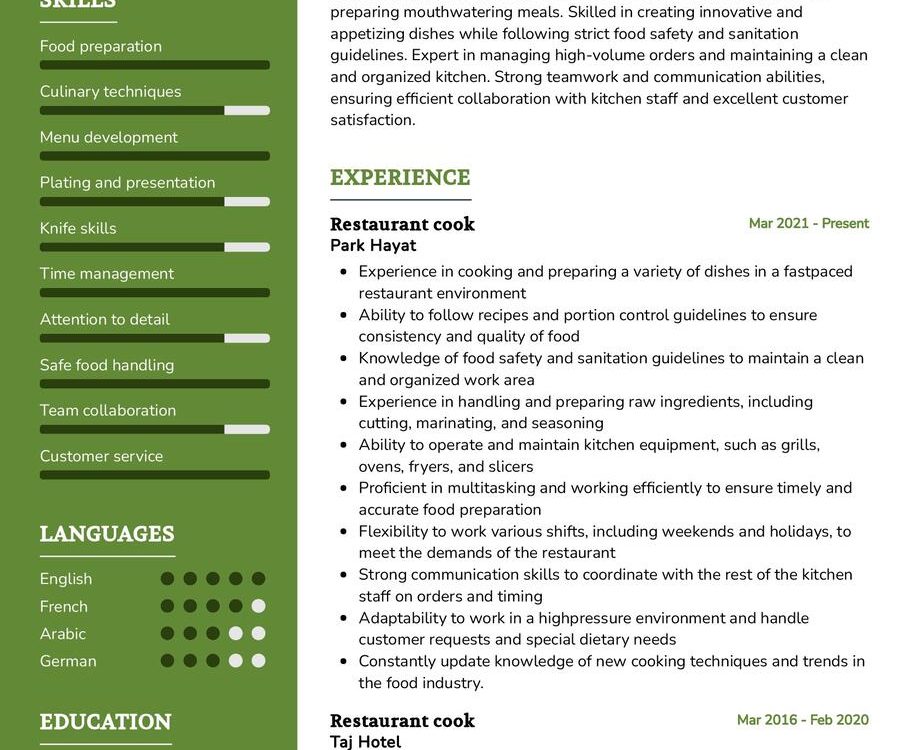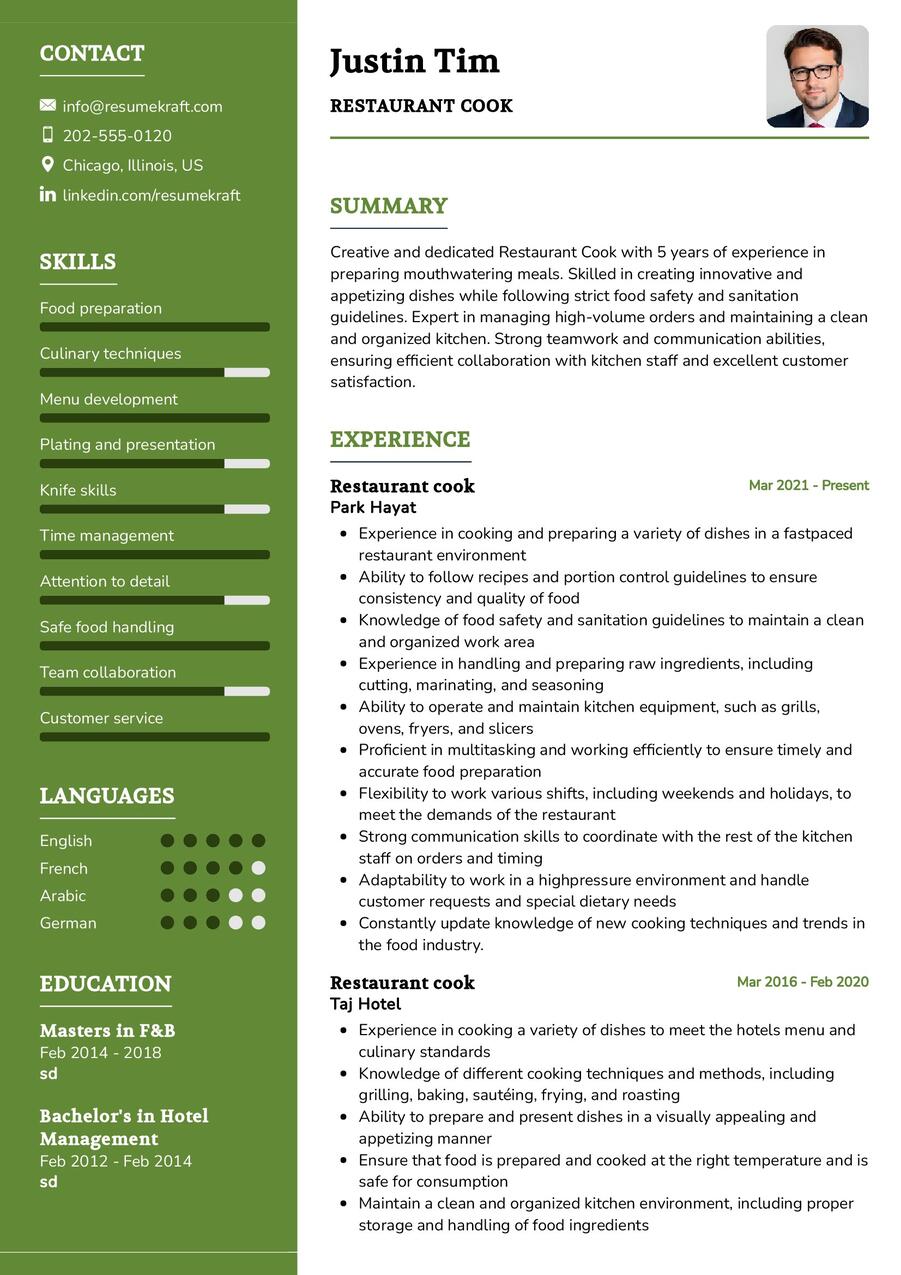Exploring the Role of a Restaurant Cook
Embarking on a culinary journey, the role of a Restaurant Cook is a dynamic blend of culinary expertise and efficient kitchen management. In an era where gastronomy plays a crucial role in the service industry, a Restaurant Cook holds a pivotal position. Let’s delve into the multifaceted responsibilities and requirements that define the path to becoming a successful Restaurant Cook, a role that demands a passion for food, precision in execution, and the ability to thrive in a fast-paced kitchen environment.
Requirements for a Restaurant Cook Position
Becoming a proficient Restaurant Cook involves meeting a set of specific requirements, blending both theoretical knowledge and practical culinary skills. Here’s a detailed look at the prerequisites one should fulfill to step into the shoes of a Restaurant Cook:
- A culinary degree or relevant certification, showcasing a strong foundation in the culinary arts.
- Extensive knowledge of various cooking techniques, cuisines, and food safety standards.
- Hands-on experience in a professional kitchen, highlighting the ability to handle the demands of a restaurant setting.
- Adaptability and resilience, traits developed through working in a high-pressure kitchen environment.
- Effective communication skills, essential for seamless collaboration with kitchen staff and waitstaff.
- Creativity in menu planning and dish presentation, showcasing a passion for culinary innovation.
Additional certifications in food safety and handling can add value to your profile in the competitive culinary job market.
Responsibilities of a Restaurant Cook
The role of a Restaurant Cook is not just about cooking; it involves a spectrum of responsibilities that contribute to the overall dining experience. Let’s unravel the core tasks that define the day-to-day life of a Restaurant Cook:
- Preparing and cooking dishes according to the restaurant’s menu and quality standards.
- Collaborating with the Head Chef to plan and execute menu items, ensuring variety and customer satisfaction.
- Maintaining a clean and organized kitchen workspace, adhering to food safety and hygiene regulations.
- Monitoring inventory levels and assisting in ingredient procurement to ensure a smooth kitchen operation.
- Training and supervising kitchen staff, fostering a positive and efficient work environment.
- Adapting to customer preferences and dietary restrictions, providing personalized culinary experiences.
- Ensuring timely and accurate preparation of dishes to meet customer demand during peak hours.
Each responsibility carries its own set of challenges and learning experiences, shaping you into a seasoned culinary professional.
Crafting an Impressive Restaurant Cook Resume
Your resume is the recipe card that showcases your culinary journey. To stand out in a sea of applications, consider the following tips when crafting your Restaurant Cook resume:
- Highlight your experience with various cuisines, emphasizing versatility in your culinary skills.
- Detail instances where you have successfully led kitchen operations, showcasing leadership abilities.
- Quantify achievements, such as improvements in kitchen efficiency or successful menu changes.
- Include any special culinary training or workshops you’ve attended, reflecting a commitment to continuous learning.
- Customize your resume for each application, aligning your skills and experiences with the specific restaurant’s needs.
Your resume is your culinary portfolio, so make it as delectable as the dishes you create.
Restaurant Cook Resume Summary Examples
Your resume summary is the amuse-bouche of your application, setting the tone for what follows. Craft a compelling summary that encapsulates your culinary journey and the value you bring to a restaurant kitchen:
- “Dedicated Restaurant Cook with over 8 years of experience, proficient in crafting diverse cuisines and leading kitchen teams to excellence.”
- “Passionate Culinary Professional specializing in farm-to-table cooking, adept at creating innovative dishes that captivate diners.”
- “Experienced Restaurant Cook with a flair for international flavors, consistently delivering high-quality dishes in fast-paced environments.”
Your summary is a flavorful introduction to your culinary expertise, leaving a lasting impression on potential employers.
Building Your Restaurant Cook Experience Section
Your experience section is the main course of your resume, narrating the stories of your culinary adventures. Here are some examples to guide you in building a robust experience section:
- “Led a team of kitchen staff in a busy downtown restaurant, achieving a 15% increase in overall kitchen efficiency.”
- “Introduced a new seasonal menu, resulting in a 25% boost in customer satisfaction and repeat business.”
- “Collaborated with the Head Chef to implement cost-saving measures, contributing to a 10% reduction in kitchen expenses.”
Each experience is a chapter in your culinary novel, showcasing your skills, leadership, and impact on the dining experience.
Educational Background for a Restaurant Cook Resume
Your educational background is the foundational recipe for your culinary success. Here’s how you can present your educational milestones:
- Diploma in Culinary Arts, XYZ Culinary Institute, where I honed my skills in classical and contemporary cooking techniques, 2014.
- Food Safety Certification, ABC Food Safety Academy, ensuring adherence to the highest hygiene standards, 2015.
- Advanced Cooking Techniques Workshop, Culinary Innovations Institute, expanding my repertoire of culinary skills, 2016.
Each educational qualification is a spice in your culinary journey, contributing to your overall flavor as a Restaurant Cook.
Essential Skills for a Restaurant Cook Resume
Your skill set is your kitchen toolkit, essential for crafting delectable dishes and running a smooth kitchen operation. Let’s list down the essential skills that a Restaurant Cook should possess:
Soft Skills:
- Time management and multitasking, crucial for handling various orders during peak hours.
- Team collaboration, fostering a positive and efficient kitchen environment.
- Communication skills, ensuring seamless coordination with kitchen staff and waitstaff.
- Creativity, essential for crafting innovative dishes and adapting to changing customer preferences.
- Adaptability, the ability to thrive in a fast-paced and dynamic kitchen setting.
Hard Skills:
- Knife skills and food preparation techniques, showcasing precision and expertise.
- Knowledge of various cooking methods, from grilling to sous-vide, ensuring versatility in menu offerings.
- Understanding of food safety standards and regulations, crucial for maintaining a hygienic kitchen environment.
- Menu planning and recipe development, contributing to the restaurant’s culinary identity.
- Ability to handle kitchen equipment and appliances, ensuring safety and efficiency in operations.
Each skill is a tool in your culinary arsenal, contributing to the success of your restaurant kitchen.
Common Mistakes to Avoid in Your Restaurant Cook Resume
As you craft your resume, steer clear of common pitfalls that can hinder your journey to landing your dream culinary job. Here are some mistakes to avoid:
- Using generic language; tailor your resume to highlight your unique culinary skills and experiences.
- Focusing solely on tasks; showcase achievements and the impact you’ve had on kitchen operations.
- Forgetting to include a cover letter; use it as an opportunity to express your passion for cooking and your fit for the role.
- Overloading your resume with technical jargon; ensure it is accessible to both culinary professionals and those less familiar with the industry.
- Neglecting proofreading; a typo can leave a negative impression on potential employers.
Avoiding these mistakes ensures that your resume is a true reflection of your culinary prowess and professionalism.
Key Takeaways for Your Restaurant Cook Resume
As we wrap up this comprehensive guide, let’s summarize the key points to keep in mind while crafting your Restaurant Cook resume:
- Emphasize your versatility, showcasing experience with various cuisines and cooking techniques.
- Highlight your impact, quantifying achievements to demonstrate your contribution to kitchen efficiency and customer satisfaction.
- Showcase continuous learning, including any additional culinary training or workshops you’ve undertaken.
- Customize your resume for each application, aligning your skills with the specific needs of the restaurant.
Remember, your resume is not just a document; it is a canvas where you paint your culinary story, a story of flavor, innovation, and kitchen leadership. Best of luck!
Finally, feel free to utilize resources like AI Resume Builder, Resume Design, Resume Samples, Resume Examples, Resume Skills, Resume Help, Resume Synonyms, and Job Responsibilities to create a standout application and prepare for the Restaurant Cook job interview.


